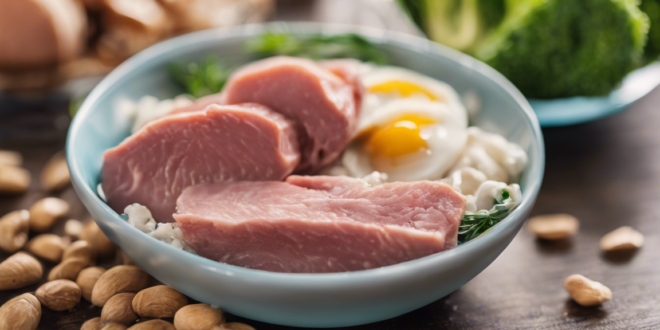Should You Eat More Protein? The Ultimate Guide to Optimizing Your Diet
In today’s fast-paced world, nutrition has become a critical aspect of maintaining health and wellness. Protein, often dubbed the body’s building block, plays a crucial role in our overall well-being. But how much protein do you really need, and what are the benefits of increasing your intake?
Understanding Protein: More Than Just Muscle Building
Protein is not just about bulking up or building muscle mass. It’s a fundamental macronutrient that serves multiple essential functions in the human body. From supporting immune function to helping repair tissue, protein is involved in nearly every biological process.
The Science Behind Protein Intake
Recent scientific research has shed light on the importance of protein beyond traditional understanding. Unlike previous recommendations, current nutritional science suggests that many people may benefit from higher protein consumption than previously thought.
How Much Protein Do You Really Need?
The recommended dietary allowance (RDA) for protein is approximately 0.8 grams per kilogram of body weight. However, this is considered a minimum requirement. Active individuals, athletes, and those over 40 may need significantly more to maintain muscle mass and overall health.
Protein Requirements by Age and Activity Level
1. Sedentary Adults: 0.8-1.0 g per kg of body weight
2. Moderately Active Individuals: 1.2-1.4 g per kg of body weight
3. Athletes and Intense Exercise Enthusiasts: 1.6-2.0 g per kg of body weight
4. Older Adults: 1.2-1.5 g per kg of body weight to prevent muscle loss
Benefits of Increased Protein Intake
1. Weight Management
Protein is more satiating than carbohydrates or fats, helping you feel full longer. This can naturally reduce overall calorie intake and support weight loss or maintenance efforts.
2. Muscle Preservation and Growth
As we age, muscle mass naturally declines. Higher protein intake can help preserve and even build muscle tissue, improving strength and metabolic health.
3. Enhanced Recovery
For those who exercise regularly, protein plays a crucial role in muscle repair and recovery, reducing soreness and improving performance.
Best Protein Sources
Not all protein sources are created equal. Here are some top recommendations:
1. Lean Meats: Chicken, turkey, and lean beef
2. Fish: Salmon, tuna, and sardines
3. Plant-Based Options: Legumes, tofu, tempeh
4. Dairy: Greek yogurt, cottage cheese
5. Eggs
6. Protein Supplements: Whey, casein, and plant-based protein powders
Potential Risks of High Protein Consumption
While protein offers numerous benefits, excessive intake can have drawbacks:
– Potential kidney strain for individuals with pre-existing kidney conditions
– Possible digestive issues
– Risk of nutrient imbalances if protein replaces other essential nutrients
Practical Tips for Increasing Protein Intake
1. Start Your Day with Protein
Include protein in breakfast to maintain energy and reduce mid-morning cravings.
2. Spread Intake Throughout the Day
Instead of consuming most protein at dinner, distribute it across meals.
3. Consider Protein Supplements
Protein powders can be an easy way to increase intake, especially for busy individuals.
4. Choose Quality Over Quantity
Focus on high-quality, nutrient-dense protein sources rather than just meeting a number.
Special Considerations
Certain groups may have unique protein needs:
– Pregnant and breastfeeding women
– Individuals recovering from surgery
– People with chronic illnesses
– Vegetarians and vegans
Consulting Healthcare Professionals
Before making significant dietary changes, it’s always recommended to consult with a registered dietitian or healthcare provider. They can provide personalized guidance based on your individual health status, goals, and potential underlying conditions.
Conclusion: A Balanced Approach
Protein is a critical component of a healthy diet. While increasing intake can offer numerous benefits, the key is finding the right balance for your individual needs. Pay attention to your body, monitor your progress, and make informed decisions about your nutritional intake.
Final Takeaway
Protein is not a one-size-fits-all solution. By understanding your body’s unique requirements and making informed choices, you can optimize your diet and support long-term health and wellness.
 Good Calories Guide GoodCalories Guide focuses on nutrition, healthy eating, and overall wellness. The site offers practical insights into evidence-based dietary practices, including tips for specific lifestyles such as veganism, keto, and family-friendly meal planning. It also addresses unique nutritional needs for individuals with conditions like diabetes or food allergies, while providing quick and accessible recipes to make healthy living a sustainable and enjoyable choice.
Good Calories Guide GoodCalories Guide focuses on nutrition, healthy eating, and overall wellness. The site offers practical insights into evidence-based dietary practices, including tips for specific lifestyles such as veganism, keto, and family-friendly meal planning. It also addresses unique nutritional needs for individuals with conditions like diabetes or food allergies, while providing quick and accessible recipes to make healthy living a sustainable and enjoyable choice.


